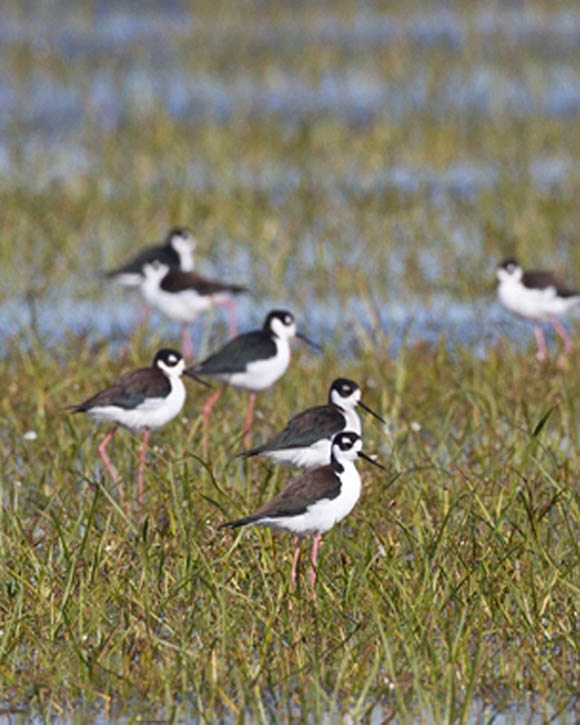
Agricultural News
Study Says USDA Effort Benefits Birds after 2010 Gulf Oil Spill
Fri, 06 Feb 2015 11:42:00 CST
 A newly released study says the United States Department of Agriculture's (USDA) effort to create habitat on private lands for migratory birds following the 2010 Deepwater Horizon oil spill has provided significant benefits to ducks, geese and other birds. The independent study conducted by Mississippi State University (MSU) on USDA's Migratory Bird Habitat Initiative (MBHI), a Farm Bill conservation effort, shows that wetlands created and enhanced by farmers provided migration and winter habitat for many more birds than unmanaged sites.
A newly released study says the United States Department of Agriculture's (USDA) effort to create habitat on private lands for migratory birds following the 2010 Deepwater Horizon oil spill has provided significant benefits to ducks, geese and other birds. The independent study conducted by Mississippi State University (MSU) on USDA's Migratory Bird Habitat Initiative (MBHI), a Farm Bill conservation effort, shows that wetlands created and enhanced by farmers provided migration and winter habitat for many more birds than unmanaged sites.
"Catastrophes like the Deepwater Horizon oil spill can have lasting impacts on waterfowl and water birds," said Robert Bonnie, USDA undersecretary for Natural Resources and Environment. "The Natural Resources Conservation Service (NRCS) worked with farmers to create alternative habitat for waterfowl and other birds through Farm Bill conservation programs. The ecosystems that NRCS helped create through this initiative are thriving."
Bonnie visited Mississippi to announce the results of this report, and was joined by U.S. Rep. Bennie Thompson and representatives from MSU and other partnering organizations.
While the university is still collecting data, findings show the initiative generated substantial ecological, environmental and economic benefits in the Gulf of Mexico region. NRCS launched MBHI in 2010, investing $40 million to work in partnership with private landowners to create migratory bird habitat on more than 470,000 acres in Alabama, Arkansas, Florida, Georgia, Louisiana, Mississippi, Missouri and Texas.
"With tomorrow marking the one-year anniversary of the signing of the 2014 Farm Bill, it's important we recognize how important this legislation is to rural America and our nation's natural resources," Bonnie said. "The Migratory Bird Habitat Initiative is one example of how farmers and ranchers are voluntarily stepping up to improve the environment."
Millions of migratory birds, including ducks, geese, and shorebirds travel the Mississippi Flyway each year to winter in Gulf of Mexico-area ecosystems, or in the case of many shorebirds, Central and South America. The study shows many of these birds benefitted from lands managed through MBHI.
"We know well-managed habitat is valuable, but this study helped us quantify how valuable," Bonnie said.
The study's findings demonstrate:
-- Rice fields flooded early through MBHI were home to an average 15 migratory birds per acre, compared to two birds per acre on rice fields not flooded;
-- Catfish ponds flooded early showed heavy biodiversity with 40 species of ducks, shorebirds and other waterbirds visiting them;
-- Over seven times more migrating shorebirds were observed on shallowly flooded idled catfish ponds enrolled in MBHI than on other catfish ponds;
-- MBHI-enrolled catfish ponds in Mississippi met nearly all the established shorebird migration habitat goal for the region; and
-- MBHI-managed habitats provided up to 28 percent of the winter waterfowl food energy needed in the Mississippi Delta and up to 25 percent needed in southwestern Louisiana.
Findings also show MBHI was particularly beneficial during the drought the region experienced following the oil spill, when many wetland habitats were dry. See more results by clicking here.
Mississippi State University's Forest and Wildlife Research Center led the independent evaluation of the initiative. MBHI is one of USDA's Landscape Initiatives, which are temporary, targeted conservation efforts to address a particular conservation need. NRCS uses the MBHI concept as the foundation for other similar NRCS efforts across the country, such as the Waterbird Habitat Enhancement Program in the Sacramento River Delta.
Click here to read more USDA's Landscape Initiatives.
WebReadyTM Powered by WireReady® NSI
Top Agricultural News
More Headlines...



















